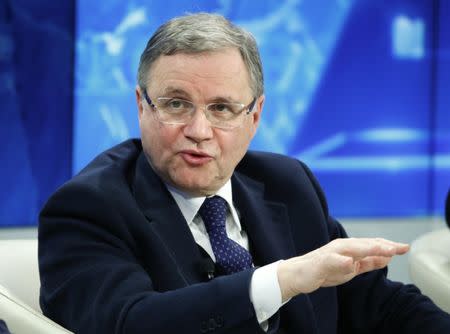Berlusconi joins criticism of Bank of Italy as Visco decision looms
By Stefano Bernabei and Philip Pullella
ROME (Reuters) - The Bank of Italy and its governor, Ignazio Visco, came under increased scrutiny on Thursday when former Prime Minister Silvio Berlusconi joined a chorus of politicians criticising its operations.
Visco's mandate expires at the end of the month and he is eligible to serve another six-year term.
But what had been considered almost a given was thrust into uncertainty on Tuesday when the ruling Democratic Party (PD) passed a parliamentary motion calling for a "new phase" at the central bank.
This was seen as implicit criticism of Visco and the bank's supervisory operations as 10 banks have collapsed in the last two years.
The "Visco Affair", which is dominating Italian media, has ignited an institutional tug-of-war between political parties and the president, who makes the ultimate decision on who to appoint as central bank chief.
Berlusconi, a key player in the centre-right coalition that is looking to make a comeback in national elections next year, joined the fray by taking a jab at the bank, echoing the attacks of the centre-left and other parties.
"The Bank of Italy did not exercise the control that was expected of it," he told reporters in Brussels in response to specific question about Visco.
However, Berlusconi's party, Forza Italia (Go Italy!) has not taken a unified stand on the bank affair and many of its members are still believed to back a second term for Visco.
According to Italian law, President Sergio Mattarella appoints the central bank governor, after consulting Prime Minister Paolo Gentiloni. The Bank of Italy's own supervisory board also has a say.
In a rare statement seen as a direct rebuke of the PD's motion against Visco, the head of state said everyone should "respect their own roles."
Mattarella favours renewing Visco, who has been in office since 2011, for a second mandate, a government source told Reuters.
CROSS-PARTY CRITICISM
The growing criticism of the central bank from virtually all the main political parties could, however, make it harder for Mattarella to re-appoint Visco, who banking sources say is a close ally of European Central Bank President Mario Draghi.
Candidates to succeed Visco include Fabio Panetta, Italy's representative to the ECB's bank supervisory board and the deputy governor of the Bank of Italy Salvatore Rossi.
The central bank has defended its actions, saying a spate of bank scandals and failures were due to Italy's worst post-war economic crisis, and it did everything in its powers to defend people's savings.
Last month, a cross-party commission was set up in parliament to investigate the bank scandals, though it is unlikely to complete its work before the election.
Though he has declined comment on the affair, Visco made an unexpected visit to the commission on Wednesday night to show members documents which Italian newspapers said defended the bank's operations.
Though the ECB started directly regulating Italy's 15 largest banks in 2014, the Bank of Italy continues to supervise the financial health of the rest of the sector.
(additional reporting by Giselda Vagnoni, Steve Scherer, Valentina Consiglio, Massimiliano di Giorgio,; Editing by Richard Balmforth)

 Yahoo News
Yahoo News 

